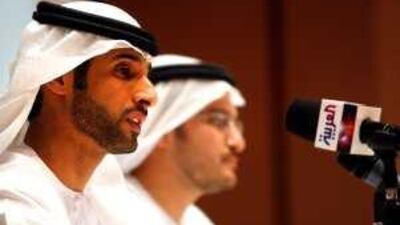ABU DHABI // A road safety campaign was launched yesterday in an attempt to reduce the emirate's "alarmingly high" rate of traffic fatalities. An average of 38 people die in vehicle wrecks every month, officials said. And as 15 per cent of all deaths in the emirate are linked to traffic accidents - yet only 11 per cent of Emiratis wear seat belts - health officials and police say action is needed.
Dr Ahmed al Mazrouei, chairman of the Health Authority - Abu Dhabi (HAAD), said that 27.4 deaths per 100,000 was an unacceptable rate and that something needed to be done to bring the numbers down. "The fatality rate is particularly high among the younger male population," said Dr al Mazrouei. "This is alarmingly high rate, and we need to educate and encourage our younger citizens about road safety."
According to HAAD figures, 89 per cent of those who die on the roads are men, most of them young. And even among expatriates, only 44 per cent wear seat belts, according to UAE University. Last year 430 people died on the roads, and 69 per cent of injury deaths in the emirate were caused by traffic accidents. Dr Oliver Harrison, head of public health at HAAD, said the authority will work closely with police and other agencies to get to the root of the problem.
Part of the programme will be a central system that all the trouble spots in the emirate and disseminates the information to any agency that needs it. Police cars will be fitted with GPS systems to track where accidents occur. That way all the agencies can strategically plan responses, which will reduce the number of accidents and deaths, officials said. It will also help identify, for example, where ambulances should be stationed.
"The police will be introducing GPS systems, and they will literally press a button which feeds back to a central system and shows where the accident has happened," Dr Harrison said. "We can all combine resources." A substantial advertising campaign will try to educate the public as well, officials said. High-profile spots on television and in cinemas, plus print adverts, will feature Sheikh Khaled Al Qassimi, the BP-Ford Abu Dhabi world rally team driver.
He said he had personally seen the devastating effects of speeding on public roads. "Everyone here knows someone who has had an accident and died on the roads, including myself," Sheikh Khaled said. "Within the last couple of years, I wanted to know what happens and why and see what we can do to stop it." Health officials said they hoped that using a popular role model would help the message about dangerous driving sink in.
"If I use my rallying skill on the road, it will cost me my life," Sheikh Khaled said. "Speeding can be like a drug: once you start, it is hard to stop. "There is a fine line. In the roads in the city you cannot avoid things if you are not driving safely. It could be a tree, a lamppost, or a life." A joint review committee will meet regularly to examine the success of the campaign. Dr Harrison said it would address the emirate's road system, street furniture and lighting to help identify potential danger zones.
Zaid al Siksek, chief executive of HAAD, said the campaign is part of a larger goal of improving the overall health of the emirate. "Our aim is to successfully educate the youth, achieve behavioural changes and self-motivate them to drive safely, substantially reducing injuries on the roads," Mr al Siksek said. People ages 25 to 29 form the largest segment of the emirate's population, according to HAAD. They also make up the majority of those killed on the roads.
Dr Jens Thomsen, section head of occupational and environmental health, said the number of deaths was "unacceptably high". "We are aware that our road safety campaign is a colossal mission and a long, arduous journey," he said. "But the results are also huge by any standards - in social terms, in economic terms and more importantly, in terms of the number of lives we can save." Dr Harrison said the number of deaths per capita among Emiratis was four times higher than that of non-Emiratis. The number of deaths by age also peaks two to three years after people pass their driving test.
Those killed "are often young men and often young husbands", Dr Harrison said. "They should be playing an active role for another 25 or 30 years into the future. Instead they are being robbed from their families and society." Last July, The National reported that first aid training would be a compulsory part of driving tests in the emirate. Dr Harrison said that these plans were still going ahead, but that nothing had been implemented.
munderwood@thenational.ae

